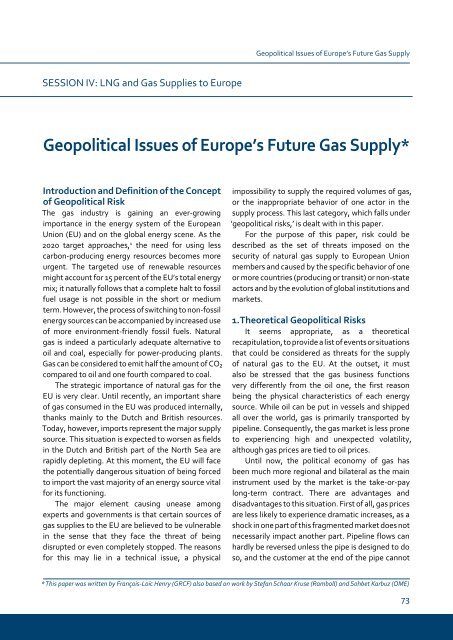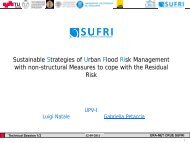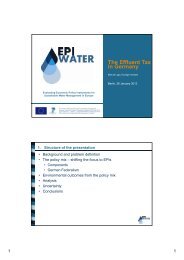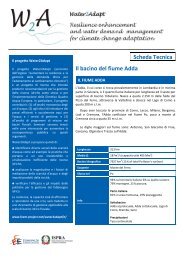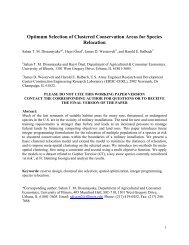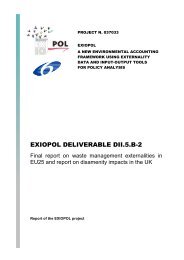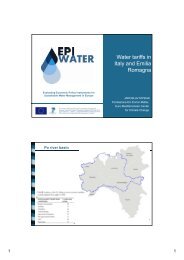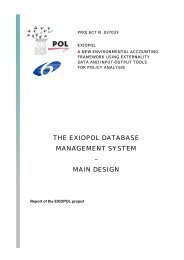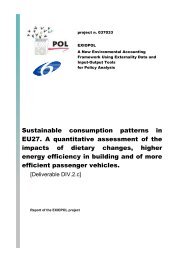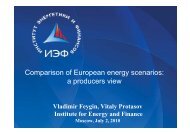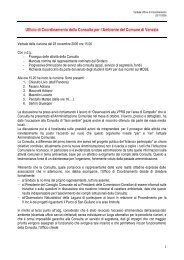Gulf and European Energy Supply Security - Feem-project.net
Gulf and European Energy Supply Security - Feem-project.net
Gulf and European Energy Supply Security - Feem-project.net
Create successful ePaper yourself
Turn your PDF publications into a flip-book with our unique Google optimized e-Paper software.
SESSION IV: LNG <strong>and</strong> Gas Supplies to Europe<br />
Geopolitical Issues of Europe’s Future Gas <strong>Supply</strong><br />
Geopolitical Issues of europe’s Future Gas supply*<br />
Introduction <strong>and</strong> Definition of the Concept<br />
of Geopolitical Risk<br />
The gas industry is gaining an ever-growing<br />
importance in the energy system of the <strong>European</strong><br />
Union (EU) <strong>and</strong> on the global energy scene. As the<br />
2020 target approaches, 1 the need for using less<br />
carbon-producing energy resources becomes more<br />
urgent. The targeted use of renewable resources<br />
might account for 15 percent of the EU’s total energy<br />
mix; it naturally follows that a complete halt to fossil<br />
fuel usage is not possible in the short or medium<br />
term. However, the process of switching to non-fossil<br />
energy sources can be accompanied by increased use<br />
of more environment-friendly fossil fuels. Natural<br />
gas is indeed a particularly adequate alternative to<br />
oil <strong>and</strong> coal, especially for power-producing plants.<br />
Gas can be considered to emit half the amount of CO₂<br />
compared to oil <strong>and</strong> one fourth compared to coal.<br />
The strategic importance of natural gas for the<br />
EU is very clear. Until recently, an important share<br />
of gas consumed in the EU was produced internally,<br />
thanks mainly to the Dutch <strong>and</strong> British resources.<br />
Today, however, imports represent the major supply<br />
source. This situation is expected to worsen as fields<br />
in the Dutch <strong>and</strong> British part of the North Sea are<br />
rapidly depleting. At this moment, the EU will face<br />
the potentially dangerous situation of being forced<br />
to import the vast majority of an energy source vital<br />
for its functioning.<br />
The major element causing unease among<br />
experts <strong>and</strong> governments is that certain sources of<br />
gas supplies to the EU are believed to be vulnerable<br />
in the sense that they face the threat of being<br />
disrupted or even completely stopped. The reasons<br />
for this may lie in a technical issue, a physical<br />
impossibility to supply the required volumes of gas,<br />
or the inappropriate behavior of one actor in the<br />
supply process. This last category, which falls under<br />
‘geopolitical risks,’ is dealt with in this paper.<br />
For the purpose of this paper, risk could be<br />
described as the set of threats imposed on the<br />
security of natural gas supply to <strong>European</strong> Union<br />
members <strong>and</strong> caused by the specific behavior of one<br />
or more countries (producing or transit) or non-state<br />
actors <strong>and</strong> by the evolution of global institutions <strong>and</strong><br />
markets.<br />
1.theoretical Geopolitical Risks<br />
It seems appropriate, as a theoretical<br />
recapitulation, to provide a list of events or situations<br />
that could be considered as threats for the supply<br />
of natural gas to the EU. At the outset, it must<br />
also be stressed that the gas business functions<br />
very differently from the oil one, the first reason<br />
being the physical characteristics of each energy<br />
source. While oil can be put in vessels <strong>and</strong> shipped<br />
all over the world, gas is primarily transported by<br />
pipeline. Consequently, the gas market is less prone<br />
to experiencing high <strong>and</strong> unexpected volatility,<br />
although gas prices are tied to oil prices.<br />
Until now, the political economy of gas has<br />
been much more regional <strong>and</strong> bilateral as the main<br />
instrument used by the market is the take-or-pay<br />
long-term contract. There are advantages <strong>and</strong><br />
disadvantages to this situation. First of all, gas prices<br />
are less likely to experience dramatic increases, as a<br />
shock in one part of this fragmented market does not<br />
necessarily impact another part. Pipeline flows can<br />
hardly be reversed unless the pipe is designed to do<br />
so, <strong>and</strong> the customer at the end of the pipe cannot<br />
* This paper was written by François-Loïc Henry (GRCF) also based on work by Stefan Schaar Kruse (Ramboll) <strong>and</strong> Sohbet Karbuz (OME)


